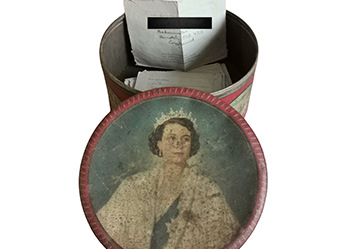University News Last updated 31 October 2024

A remarkable collection of personal letters sent home by Caribbean migrants from 1964-75 uncovered by a Birmingham City University (BCU) researcher represent a “watershed moment in Black British historiography” as they challenge dominant media narratives.
“With their authentic account of Caribbean migration experiences, they provide unique insights into a rarely documented period of Caribbean diaspora history,” said Dr Rachel-Ann Charles, whose research aims to decolonise media portrayals of early Caribbean immigrants.
“They reveal stories of the deep, intricate tapestry of Black British life that spans generations.”
The preserved letters, which were stored in a vintage box and tin, give new perspectives on Caribbean migration patterns and insights into the social and emotional impact of migration.
According to Dr Charles, they also counter tabloid media’s twentieth-century portrayal of Caribbean immigrants as “unemployed burdens on society”.
“Instead, they reveal hardworking individuals often holding multiple jobs,” she explained.
References to exhaustion and financial strain are common across letters: “I think things will be hard in this country... People think this country is a bed of roses, but it is not even for people who were born in this country,” (27 June 1967).
The letters also demonstrate cultural contributions and integration of Caribbean immigrants.
This can be seen through filmmaking, “I have also made a film for central office of information... It will be shown in America, Europe and some of West Indian Island" (22 August 1971) and participation in British pastimes, “I will also be entering some of my pigeons in the Olympia Royal dairy show,” (21st October 1966).
“Hidden in tins for decades, these deeply personal artefacts capture the voices, emotions, and lived experiences of Caribbean people during a transformative period of migration,” added Dr Charles, BA (Hons) Journalism course director at BCU.
“They go beyond official records and statistics to offer a crucial counterpoint to mainstream media narratives, revealing a richer, more nuanced picture of Caribbean migrants’ lived experiences and their role in shaping modern British society.
“Each letter tells a story of courage, ambition, and the unbreakable bonds between families and friends separated by oceans.”
Now Dr Charles is launching a wider initiative to uncover more of these historical treasures.
“Many families across the Caribbean have similar collections stored away in old tins, boxes, or albums – each one holding precious memories and important historical perspectives to be preserved and studied,” commented Dr Charles.
“Black History Month reminds us of the importance of telling our stories through our own voices. These letters offer an opportunity to rewrite historical narratives from the perspective of those who lived them.”
Dr Charles and her research team are particularly interested in:
- Letters exchanged between Caribbean migrants and their families
- Personal photographs and documents from the migration period
- Diaries and written accounts of migration experiences
- Official documentation and correspondence
- Family memorabilia from the era
“These letters offer invaluable insights into the Caribbean migration experience that cannot be found in official records,” noted Dr Charles.
“Each discovery adds another layer to our understanding of this crucial period in history. We must preserve these precious documents for future scholars and families alike.”
To contribute to this research or learn more about the ‘Decolonising Media Portrayals of Early Caribbean Immigrants’ project, please contact Dr Rachel-Ann Charles.